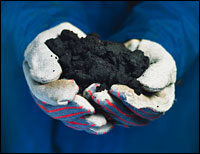Canada has about as much recoverable oil in its tar sands as Saudi Arabia has conventional oil. They should leave most of it in the ground.

Tar sands are pretty much the heavy gunk they sound like, and making liquid fuels from them requires huge amounts of energy for steam injection and refining. Canada is currently producing about one million barrels of oil a day from the tar sands, and that is projected to triple over the next two decades.
The tar sands are doubly dirty. On the one hand, the energy-intensive conversion of the tar sands directly generates two to four times the amount of greenhouse gases per barrel of final product as the production of conventional oil. On the other hand, Canada’s increasing use of natural gas to exploit the tar sands is one reason that its exports of natural gas to U.S. are projected to shrink in the coming years.
So instead of selling clean-burning natural gas to this country, which we could use to stop the growth of carbon-intensive coal generation, Canada will provide us with a more carbon-intensive oil product to burn in our cars. That’s lose-lose.
From a climate perspective, fully exploiting the tar sands resource would make Canada’s climate policy as immoral as ours. The tar sands are almost as bad as liquid coal.
If you’d like to see some good recent critiques of the tar sands economics and impact, Energy and Capital has what you’re looking for in two excellent posts. The first is on cost issue, and concludes:
If the royalties on the tar sands were allowed to rise to anywhere near the normal levels for oil-around 40%, not 1% — the entire industry would cease to be. The profit would vanish, simple as that.
The second is on water, energy, labor, and the environment. The tar sands, like liquid coal, is a water hog. The article notes, “According to a recent joint study by the University of Toronto and the University of Alberta, the projected expansion of the tar sands projects will kill the Athabasca River, the only abundant source of water in the area.”
Is Canada wise enough not to fully develop the tar sands? As of today, the answer appears to be “no.”
This post was created for ClimateProgress.org, a project of the Center for American Progress Action Fund.




